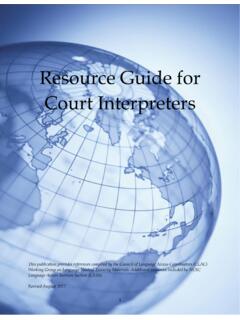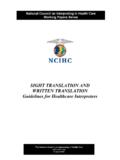Transcription of CODE OF ETHICS FOR INTERPRETERS Interpreter Role Statement
1 Fundamentals of Interpretation 9 CODE OF ETHICS FOR INTERPRETERS Interpreter Role Statement To deliver, as faithfully as possible, messages transmitted between individuals who do not share a common language. The Interpreter s performance is governed by 8 ethical principles. 1. Accuracy and Fidelity INTERPRETERS strive to render all messages in their entirety accurately, as faithfully as possible and to the best of their ability without addition, distortion, omission or embellishment of the meaning. 2. Confidentiality INTERPRETERS will not disclose and will treat as confidential all information learned, either uttered or written in the performance of their professional duties, while adhering to relevant requirements regarding disclosure. 3. Impartiality INTERPRETERS strive to maintain impartiality by showing no preference or bias to any party involved in the interpreted encounter.
2 4. Respect for Persons INTERPRETERS demonstrate respect towards all parties involved in the interpreted encounter 5. Maintaining Role Boundaries INTERPRETERS strive to perform their professional duties within their prescribed role and refrain from personal involvement. 6. Accountability INTERPRETERS are responsible for the quality of interpretation provided and accountable to all parties and the organizations engaging the Interpreter s service. 7. Professionalism INTERPRETERS at all times act in a professional and ethical manner. 8. Continued Competence INTERPRETERS commit themselves to lifelong learning in recognition that languages, individuals, and services evolve and change over time and a competent Interpreter strives to maintain the delivery of quality interpretation. Fundamentals of Interpretation 10 1.
3 Ethical Principle: Accuracy and Fidelity Objective: Preservation of the meaning of the message. INTERPRETERS strive to render all messages in their entirety accurately, as faithfully as possible and to the best of their ability without addition, distortion, omission or embellishment of the meaning. Standards The Interpreter renders all utterances and written communication faithfully using the same grammatical person as the speaker or writer. The rendition should sound natural in the target language and there should be no distortion of the original message through additions, omissions, or explanation. The idiom, register, style and tone of the speaker is preserved. The Interpreter advises all parties that everything said in the encounter will be interpreted. If any party requests that the Interpreter refrain from interpreting all utterances, the Interpreter is obliged to interpret the request to all parties and restate their obligation to interpret everything being uttered.
4 The Interpreter retains English words mixed into the other language, as well as culturally bound terms which have no direct equivalent in English, or which may have more than one meaning. Whenever possible, the Interpreter will attempt a translation of that word to provide the listener with an idea of what the word means. The Interpreter asks for repetition, rephrasing, or explanation, if anything is unclear. Upon recognizing that the Interpreter has misunderstood the communication, she/he identifies the misunderstanding and requests direction from the parties involved. The Interpreter ensures that the meaning of gestures, body language, and tone of voice is not lost, by replicating what has been seen or heard by the Interpreter . The Interpreter uses a mode of interpreting appropriate for the setting.
5 In most interview situations, spoken-language interpreting is done in consecutive mode. The Interpreter performs summary interpretation ( some of the elements of the communication are not interpreted) only with the knowledge and consent of all parties. Fundamentals of Interpretation 11 2. Ethical Principle: Confidentiality Objective: Protection of the privacy of all parties and the confidentiality of information. INTERPRETERS will not disclose and will treat as confidential all information learned, either uttered or written in the performance of their professional duties, while adhering to relevant requirements regarding disclosure. Standards The Interpreter advises all parties that she or he will respect the confidentiality of the encounter except when required by law to disclose information.
6 All parties in an interpreted encounter have a right to expect that the Interpreter will hold information about them in confidence. The Interpreter does not disclose information spoken, seen or written outside of the interpreting situation without the expressed permission of all parties or unless required by law. If disclosing the time and/or place of an encounter may identify the purpose, persons or content, the Interpreter shall not disclose such information. The Interpreter may, where collaborative work with other professionals is required, be briefed, or participate in, relevant discussions with other INTERPRETERS , members of the team involved with the other party, authorized representatives of the interpreting agency and/or the service-providing institution. In these situations the Interpreter must maintain professional boundaries and not engage in providing opinions.
7 Anyone receiving information in order to provide interpretation service is ethically bound by the duty of confidentiality. 3. Ethical Principle: Impartiality Objective: Full communication not impeded by any bias or preference of the Interpreter . Avoidance of the perception that the Interpreter has a preference or bias towards any party involved in the interpreted encounter. INTERPRETERS strive to maintain impartiality by showing no preference or bias to any party involved in the interpreted encounter. Fundamentals of Interpretation 12 Standards The Interpreter remains impartial at all times and informs all parties of the duty to remain impartial. The Interpreter declines to interpret when she or he has a personal or any vested interest in the outcome of the encounter. The Interpreter declines to interpret when his or her personal or other relationship with any party may affect, or be perceived by any party to affect, impartiality.
8 The Interpreter declines to interpret when any situation, factor, or belief exists that represents a real or potential conflict of interest for the Interpreter . The Interpreter discloses to all parties in the encounter any personal or other relationship that may affect, or be perceived by any party to affect, the Interpreter s impartiality. The Interpreter informs the Interpreter service agency/organization when he or she has a personal or other vested interest in the outcome of the assignment or when any situation, factor, or belief exists that represents a real or potential conflict of interest which will impact an Interpreter s ability to interpret everything faithfully and impartially. 4. Ethical Principle: Respect for Persons Objective: Respect of parties to the interpreted encounter. Demonstration of an acknowledgement of the inherent dignity of all parties in the interpreted encounter INTERPRETERS demonstrate respect towards all parties involved in the interpreted encounter.
9 Standards The Interpreter demonstrates respect for all parties. The Interpreter promotes direct communication among all parties in the interpreted encounter. Fundamentals of Interpretation 13 The Interpreter engages in behaviour that promotes autonomy and personal choice of the individuals involved in the interpreted encounter. 5. Ethical Principle: Maintenance of Role Boundaries Objective: Protection of professional integrity. Reduction of exposure to liability. Maintenance of emotional well-being and physical safety of Interpreter . INTERPRETERS strive to perform their professional duties within their prescribed role and refrain from personal involvement. Standards The Interpreter s role is to enable communication between parties, who speak on their own behalf and make their own decisions.
10 The Interpreter does not advocate on behalf of any party. The Interpreter does not enter into the discussion, give advice or express personal opinions about the matter of the encounter, or show reactions to any of the parties. The Interpreter does not filter communication, mediate, or speak on behalf of any party. The Interpreter avoids unnecessary contact with the parties prior to and after the encounter. If the Interpreter needs to initiate contact to confirm details or convey information related to an encounter, such as during the performance of a message relay, the Interpreter will strictly adhere to protocols governing such contact. The Interpreter does not perform services other than interpretation services for any party. The Interpreter utilizes the least obtrusive mode of interpretation.







